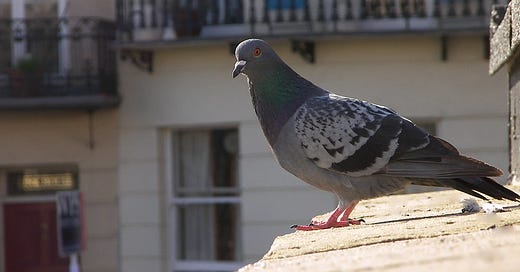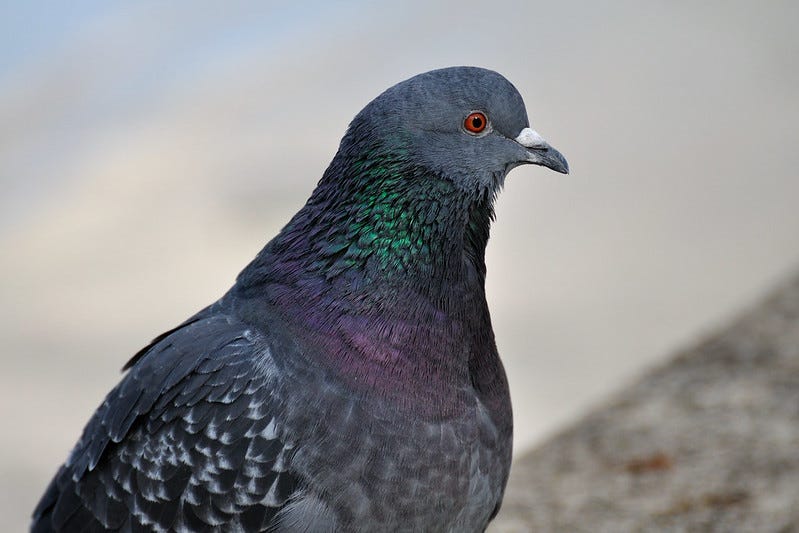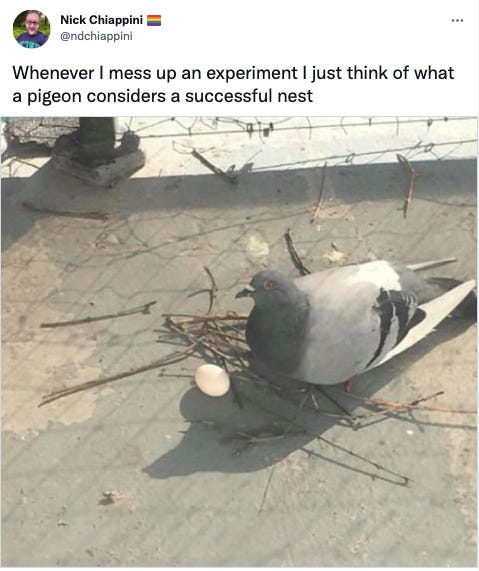Here at Bird of the Week, we bow down with unconditional love and respect for each and every avian creature, but even we have to admit…some are better than others. All are distinguished, but some are gods. This week, we’re honoring one of those kings of the sky and frankly, one of the all-time animals of the planet: the pigeon! If I’m being honest, I don’t even know where to begin. I’m overwhelmed with affection for this bird!
Before we begin, I should say that there’s a big wide world of pigeons and doves out there, but we’re zeroing in on the one we know best, the bird known as the domestic/feral/rock pigeon or dove (Columba livia). For the duration of the blog, please imagine me shouting all of this absolutely breathlessly like a child delivering a school report after learning that the human head weighs eight pounds.
*Deep breath* Pigeons are endlessly adaptable. They thrive in the city or the countryside, and live on every single continent on Earth with the exception of Antarctica. They are that bitch.
Pigeons are highly intelligent animals. They can recognize themselves in a mirror and discern human faces, can distinguish written words, are incredible multitaskers, are able to detect cancer as well as humans, and may even be able to understand space and time. Like I said, gods among men!
Pigeons were first domesticated thousands of years ago, and they’ve played an integral role in human history. Their job record is unparalleled! We’ve harnessed the power of pigeons to deliver messages during World Wars I and II (pigeons are troops but also, I assume, conscientious objectors), they’ve been employed by the Coast Guard to rescue people at sea, and recruited into a life of crime to smuggled cigars, and are now at the forefront of the environmental movement, helping scientists collect climate data. Their prowess as strong fliers with remarkable navigation skills and memory is unmatched, and humans have been reaping the benefits for millennia. Plus, look at them!
*Still shouting* Pigeons have gorgeous, iridescent plumage, and come in many different colors and patterns. No one ever thinks about the aesthetic majesty of pigeons, but they are stunning and have an iconic place in the fine art world.
Pigeons are loyal, mate for life, engage in elaborate courting behaviors, and co-parent like socialist champions. They even produce “milk” for their young because I guess they wanted to know what it was like to walk in another species’ shoes. Beautiful. And probably the single greatest fact about pigeons, among many great facts, is that they build hilariously bad nests that are actually good. What humble kings.
Despite the fact that pigeons have an insane reputation for being filthy, they’re actually quite clean, and help to keep urban spaces clean as well. Doing their part!! Why they get no respect for this is beyond me. People call pigeons “rats with wings” which is criminally rude to both parties and brings me to the central point of this blog (eloquently stated by Discourse Blog editor Jack): pigeons get a raw deal!!!
Literally the amount of fascinating facts about pigeons is so overwhelming I had to cut myself off while researching this blog, and yet they’re treated like pests. We take them for granted because they’re ubiquitous, but pigeons are quietly one of the most elegant, powerful, useful, and enduring animals among us. They’re ordinary and extraordinary, and carry both identities with sheer grace. They’ve got a working-class legacy and, like the working class, have more power than they get credit for. Here’s hoping pigeons never go the way of the passenger pigeon or another relative, the dodo. Here’s hoping they outlive us all.
Your favorite bird is not as good as the pigeon (sorry!), but we still want to hear about it for a future installment of Bird of the Week! Email us at hello@discourseblog.com so we can argue about it, and be sure to peep our full catalog of Birds of the Week.











They make great pets too and you can just grab one off the street, but you gotta be careful how old they are because if they're too young they haven't gotten the crop milk yet and won't survive, and if they're too old they've probably already mated, which they do for life so it and its mate will be depressed and not survive.
Good blog. These birds haven't been neglected by biologists: I refer you to my man Darwin. He bred 'em, and devoted a big chunk of On the Origin of Species to their adaptations. Maybe just as important to his ideas as you know, finches. https://www.darwinspigeons.com/ for maybe more than you want to get into.